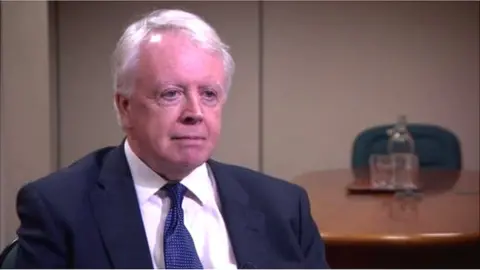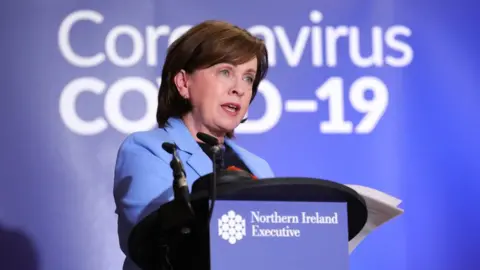Coronavirus: Investigation to be held into Covid grant payments
 Getty Images
Getty ImagesAn investigation will be held into how more than £4m was paid in error to hundreds of businesses through an emergency Covid-19 support grant.
NI's Auditor Kieran Donnelly told BBC News NI he would carry out the inquiry as soon as possible.
The final cost of the payments could run to more than £13m, he said.
Four Sinn Féin members resigned last week over a seven-month delay in returning £10,000 payments made to three offices.
The £10,000 payment was sent automatically to any business in receipt of small business rates relief but some were found to be ineligible.
That included three Sinn Féin offices. The party repaid the money but the delay led to the resignations of the four members, including senator Elisha McCallion and MLA Catherine Kelly.
Mr Donnelly said he planned to examine how the Department of Economy would to get the money back.

Some of the mistakes already uncovered show how people received duplicate payments, getting £20,000 instead of £10,000.
Errors were also made in paying landlords the grant rather than their tenants, who were the ones impacted by the Covid-19 restrictions.
Economy Minister Diane Dodds told the NI Assembly this week all the money paid out in error would be recovered.
She revealed that of the 452 payments made incorrectly, 74 have been recouped by her department.
That amounts to £4.5m being paid out and just over £700,000 being clawed back.
But in his assessment, the auditor general estimates the total value of payments made in error could be around £13.5 million.
'£13.5m ineligible payments'
Mr Donnelly carried out an initial audit of the scheme and reviewed payments made on a sample basis but is now planning a more detailed examination.
"The ineligible payments identified by my staff, if extrapolated across the total scheme, indicates the potential of up to £13.5 million of ineligible payments, which I believe to be material in the context of the scheme payments," said Mr Donnelly.
"Among the mistakes uncovered included businesses not operating from the property on which the grant was paid, and were therefore not entitled to receive the grant, despite in most cases completing an online declaration."
He revealed the department was working on the assumption that a business would not "willingly pay full occupied rates for premises it was not occupying".
"The business had not therefore identified this fact to LPS (Land Property Services) at the point at which the grant payments were issued," he said.
"I also note that LPS has identified other types of error that they are currently reviewing, such as landlords receiving payments instead of the tenant and duplicate payments made."
The report notes a memorandum of understanding was agreed between the Departments for the Economy, Department of Finance and Invest NI to deliver the scheme.
'Pragmatic approach'
It sets out how the Department of the Economy assumed responsibility for the scheme on behalf of the executive including "any potential error, fraud or losses arising from the administration of the scheme".
The Department of Finance, through the Land Property Service (LPS), was responsible for the identification and checking of eligible businesses and making the payments to those businesses.
The report explains how data on ratepayers from the LPS was used to determine who was eligible, but the auditor noted this was not the "normal intended purpose of the LPS information".
"This brought some risk but was a pragmatic approach in the absence of any better information," the auditor added.
 PAcemaker
PAcemakerDiane Dodds has defended her department's handling of the scheme and insisted it had the full backing of the executive.
She told MLAs that ineligible payments issued amounted to less than 2% of all grants approved by the Department for the Economy back in March.
"I am content my department took the necessary and swift action to support tens of thousands of businesses and jobs under threat caused by Covid-19," said Mrs Dodds.
"Payments made in error will be recovered and we will be writing to everyone that we identify as being ineligible for payment and asking them to return the money.
"It is important that we have proper accountability for taxpayers' money and; indeed; particularly important at a time like this when so many businesses and individuals are suffering."
The minister said her department was also committed to carrying out a post-scheme evaluation.
